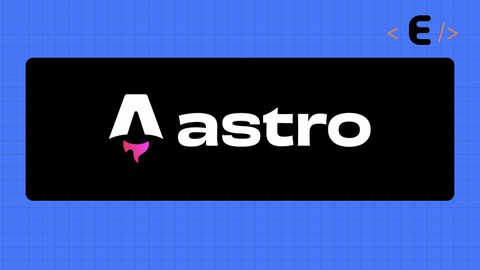
AstroJS 101: Build Blazing Fast Frontends!
AstroJS 101: Build Blazing Fast Frontends!, available at $19.99, has an average rating of 4.54, with 92 lectures, 4 quizzes, based on 111 reviews, and has 1116 subscribers.
You will learn about Learn to use React, Preact, Svelte, Vue, and Beyond in your Astro application. Understand Component Islands: a Modern Web Architecture for Building Faster Websites. Build Modern Practical Real-world Applications. Get Started with Astro: One of the Fastest Frontend Libraries Out There. Understand Responsible Hydration and Why it Matters. Learn How Component Islands Work in Astro. Understand the Behaviour of Astro Component Markup, Styles and Scripts. Learn what "Zero Javascript" Means in Practical Terms. Learn the Powerful Astro Template Syntax and How it Differs from JSX. Build your own Component Islands Implementation from Scratch. This course is ideal for individuals who are Web developers looking to build modern content websites or Frontend (React, Vue etc.) engineers who want to build much faster websites It is particularly useful for Web developers looking to build modern content websites or Frontend (React, Vue etc.) engineers who want to build much faster websites.
Enroll now: AstroJS 101: Build Blazing Fast Frontends!
Summary
Title: AstroJS 101: Build Blazing Fast Frontends!
Price: $19.99
Average Rating: 4.54
Number of Lectures: 92
Number of Quizzes: 4
Number of Published Lectures: 92
Number of Published Quizzes: 4
Number of Curriculum Items: 96
Number of Published Curriculum Objects: 96
Original Price: $124.99
Quality Status: approved
Status: Live
What You Will Learn
- Learn to use React, Preact, Svelte, Vue, and Beyond in your Astro application.
- Understand Component Islands: a Modern Web Architecture for Building Faster Websites.
- Build Modern Practical Real-world Applications.
- Get Started with Astro: One of the Fastest Frontend Libraries Out There.
- Understand Responsible Hydration and Why it Matters.
- Learn How Component Islands Work in Astro.
- Understand the Behaviour of Astro Component Markup, Styles and Scripts.
- Learn what "Zero Javascript" Means in Practical Terms.
- Learn the Powerful Astro Template Syntax and How it Differs from JSX.
- Build your own Component Islands Implementation from Scratch.
Who Should Attend
- Web developers looking to build modern content websites
- Frontend (React, Vue etc.) engineers who want to build much faster websites
Target Audiences
- Web developers looking to build modern content websites
- Frontend (React, Vue etc.) engineers who want to build much faster websites
Are you tired of sluggish web performance? Frustrated with heavy JavaScript frameworks bogging down your websites? It’s time for a revolution, and Astro is leading the charge!
Problem Statement: In the fast-paced world of web development, speed and efficiency are everything. Traditional JavaScript frameworks often sacrifice performance for flexibility, leaving developers with bloated sites and sluggish load times. Astro changes the game by putting speed at the forefront, empowering developers like you to create lightning-fast websites with ease.
Course Overview: Join us in this comprehensive online course where we’ll demystify Astro, the game-changing JavaScript framework built for speed. Whether you’re a seasoned developer or just starting your journey, you’ll gain invaluable insights into how Astro empowers you to build performant websites like never before.
At the end of the course you’ll gain in-depth understanding into Astro, and have a rock-solid introduction to Astro – the framework designed for speed.
Highlights:
-
Astro Fundamentals:
-
Harness the power of Astro to build your personal website from scratch.
-
Set up a local development environment effortlessly.
-
-
Component Islands Mastery:
-
Dive deep into Astro’s groundbreaking architecture of component islands.
-
Discover how Astro extracts your UI into smaller, isolated components, ensuring blazing-fast load times.
-
Learn to leverage the flexibility of Astro with your favorite frameworks like React, Vue, Svelte, and Tailwind CSS.
-
-
Practical JavaScript Insights:
-
Demystify the concept of “zero JavaScript” and its real-world implications.
-
Understand why shedding the JavaScript runtime overhead is a game-changer for web performance.
-
-
Mastering Astro Components:
-
Get hands-on with Astro component markup, styles, and scripts.
-
Unlock the full potential of Astro’s template syntax, distinct from JSX.
-
-
Unleash Component Islands:
-
Dive deep into the core of Astro’s architecture and build your own component islands from scratch.
-
Comprehend the magic of Astro’s component islands and their pivotal role in web development.
-
-
Optimized Hydration:
-
Explore responsible hydration and why it’s critical for seamless user experiences.
-
-
The Island Advantage:
-
Gain a profound understanding of why component islands are essential for modern web development.
-
Prerequisites for the course
-
Familiarity with HTML and CSS basics
-
Familiarity with JavaScript basics
Embrace the Future of Web Development.
Astro isn’t just another framework; it’s a revolution in web development. By the end of this course, you’ll have the skills and knowledge to create faster, more efficient websites with Astro, leaving your competition in the dust.
Say goodbye to sluggish web performance and hello to a new era of web development!
Course Curriculum
Chapter 1: Build your first Astro Application
Lecture 1: (Extra) PDF: Understanding Astro (500+ Page Practical Book to Master Astro)
Lecture 2: Project overview
Lecture 3: Installing NodeJS and Setting up your Code Editor
Lecture 4: The Astro Install Wizard
Lecture 5: Understanding the Astro Project Structure
Lecture 6: Introduction to Astro Pages
Lecture 7: The Anatomy of an Astro Component
Lecture 8: Astro Component Styles
Lecture 9: Reusable Page Layouts
Lecture 10: Capitalising component names
Lecture 11: The global style directive
Lecture 12: Custom fonts and global CSS
Lecture 13: Independent Astro components
Lecture 14: Adding interactive scripts to Astro components
Lecture 15: Adding an Interactive theme toggle
Lecture 16: The :global() selector
Lecture 17: Event Handling
Lecture 18: Theming via CSS variables
Lecture 19: Accessing global client objects
Lecture 20: The magic of scripts
Lecture 21: Leveraging inline scripts
Lecture 22: Beware of Global Selectors in Scripts
Lecture 23: Using Markdown for Pages
Lecture 24: How to Navigate between Astro Pages
Lecture 25: Uniformity via Markdown Layouts
Lecture 26: Composing Layouts in Astro
Lecture 27: Astro Component Props
Lecture 28: Leveraging Markdown Frontmatter Properties
Lecture 29: Interactive Navigation State with Astro Scripts
Lecture 30: Composing Astro Components
Lecture 31: Complete Component Card Navigation
Lecture 32: Astro's Template Flow of Data
Lecture 33: The Dark Side of define:vars
Lecture 34: How to Load Multiple Files in Astro – Part 1
Lecture 35: How to Load Multiple Files in Astro – Part 2
Lecture 36: Deploying a static Astro site
Lecture 37: How Fast is Our Astro Website? Shocker!!!
Chapter 2: Astro Components In-depth
Lecture 1: Introduction
Lecture 2: The Javascript Runtime Fatigue
Lecture 3: Ditching the Javascript Runtime
Lecture 4: What is an Astro Component? – Part 1
Lecture 5: Manual Astro Installation and Rendering HTML
Lecture 6: The Bliss of Composability
Lecture 7: The Root Element and Local Styles in Compositions
Lecture 8: Hoisting the Head Element?
Lecture 9: Revisiting the Component Script Section
Lecture 10: Fetching Data in Astro
Lecture 11: Revisiting the Component Template Section
Lecture 12: Dynamic Tags in Astro
Lecture 13: The Magic of Slots in Astro
Lecture 14: Similarities and Differences to JSX
Lecture 15: What is an Astro Component? Conclusion
Chapter 3: Build Your Own Component Island
Lecture 1: Introduction
Lecture 2: A Brief History of how we Got Here
Lecture 3: The Basics of Client-Side Rendering (CSR)
Lecture 4: The PROs and CONs of Client-Side Rendering
Lecture 5: The Basics of Server-Side Rendering (SSR)
Lecture 6: The PROs and CONs of Server-Side Rendering (SSR)
Lecture 7: Server-Side Rendering with Client-Side Hydration
Lecture 8: The Pros of Server-Side Rendering With Client-Side Hydration
Lecture 9: Partial Hydration for the Win
Lecture 10: Where do Component Islands Come From?
Lecture 11: Objectives and API Design
Lecture 12: Getting Started with Mini-island
Lecture 13: The Content Template element
Lecture 14: Hydration Implementation
Lecture 15: Partial Hydration Implementation – Part 1
Lecture 16: Partial Hydration Implementation – Part 2
Lecture 17: Client:visible Lazy Hydration Implementation
Lecture 18: Client:media Lazy Hydration Implementation
Lecture 19: Vue Framework Support (Mini-island)
Lecture 20: Preact Framework Usage (Mini-island)
Lecture 21: Conclusion
Chapter 4: The Secret Life of Astro Component Islands
Lecture 1: Introduction
Lecture 2: When Should you Use a Framework Component?
Lecture 3: Step 1: Build an Astro site
Lecture 4: Step 2: Install the Framework Integration
Lecture 5: Steps 3 & 4: Write and Render the Framework Component
Lecture 6: Getting Started with Responsible Hydration
Lecture 7: The Client:load Directive
Lecture 8: The Client:only Directive
Lecture 9: The Client:idle Directive
Lecture 10: The Client:visible Directive
Lecture 11: The Client:media Directive
Lecture 12: Using Multiple Frameworks in Astro
Lecture 13: Sharing State between Component Islands
Lecture 14: Handling Props (and Children) in Framework Components
Lecture 15: Using Multiple Slots in Framework Components
Lecture 16: Nested Framework Components
Lecture 17: Astro Island Gotchas
Lecture 18: Conclusion – Why islands?
Chapter 5: Conclusion
Instructors
-
Ohans Emmanuel
Staff Engineer and Published Author.
Rating Distribution
- 1 stars: 0 votes
- 2 stars: 1 votes
- 3 stars: 7 votes
- 4 stars: 31 votes
- 5 stars: 72 votes
Frequently Asked Questions
How long do I have access to the course materials?
You can view and review the lecture materials indefinitely, like an on-demand channel.
Can I take my courses with me wherever I go?
Definitely! If you have an internet connection, courses on Udemy are available on any device at any time. If you don’t have an internet connection, some instructors also let their students download course lectures. That’s up to the instructor though, so make sure you get on their good side!
You may also like
- Top 10 Content Creation Courses to Learn in December 2024
- Top 10 Game Development Courses to Learn in December 2024
- Top 10 Software Testing Courses to Learn in December 2024
- Top 10 Big Data Courses to Learn in December 2024
- Top 10 Internet Of Things Courses to Learn in December 2024
- Top 10 Quantum Computing Courses to Learn in December 2024
- Top 10 Cloud Computing Courses to Learn in December 2024
- Top 10 3d Modeling Courses to Learn in December 2024
- Top 10 Mobile App Development Courses to Learn in December 2024
- Top 10 Graphic Design Courses to Learn in December 2024
- Top 10 Videography Courses to Learn in December 2024
- Top 10 Photography Courses to Learn in December 2024
- Top 10 Language Learning Courses to Learn in December 2024
- Top 10 Product Management Courses to Learn in December 2024
- Top 10 Investing Courses to Learn in December 2024
- Top 10 Personal Finance Courses to Learn in December 2024
- Top 10 Health And Wellness Courses to Learn in December 2024
- Top 10 Chatgpt And Ai Tools Courses to Learn in December 2024
- Top 10 Virtual Reality Courses to Learn in December 2024
- Top 10 Augmented Reality Courses to Learn in December 2024






















